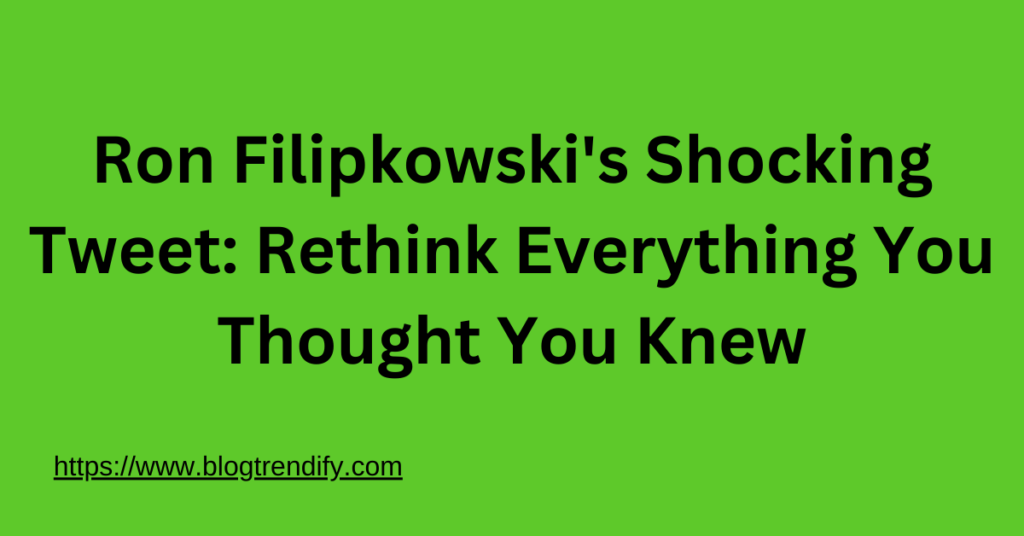Introduction
Table of Contents
ToggleRon Filipkowski’s shocking tweet that challenges your perceptions. Discover the truth behind the headlines and engage with the conversation today.
Social media has the power to inform, inspire, and disrupt—and sometimes, one tweet can stop us in our tracks. Ron Filipkowski, a prominent attorney, political commentator, and social media influencer, is no stranger to creating waves with his insights.
Recently, one of his tweets captured the internet’s attention, sparking debates and making people question their beliefs. In this article, we’ll dive into the context, impact, and lessons from this now-viral tweet that has everyone rethinking what they thought they knew.
Who is Ron Filipkowski?
Background
Ron Filipkowski is a former federal prosecutor turned outspoken critic of political extremism and misinformation. Known for his sharp wit and incisive commentary, he’s built a reputation as a reliable source for decoding complex political and social issues.
Why People Listen to Him
With years of legal expertise and a knack for breaking down intricate topics into digestible insights, Filipkowski has become a trusted voice for many. His followers turn to him for clarity on topics that are often muddied by partisanship or sensationalism.
The Tweet That Sparked It All
What Did the Tweet Say?
Filipkowski’s tweet read:
“When the truth threatens power, power will always call it a lie. Stay curious, stay skeptical, and don’t stop asking questions.”
This simple yet profound statement resonated across social media platforms, amassing thousands of retweets, likes, and comments within hours.
Why It Went Viral
- Universal Relevance: The tweet touched on themes of truth, power, and critical thinking, which resonate deeply in today’s climate of information overload.
- Timeliness: It arrived amidst a high-profile controversy involving misinformation and accountability, making it particularly poignant.
- Brevity with Impact: Filipkowski’s ability to distill complex ideas into a single thought struck a chord with readers.
What Makes This Tweet So Powerful?
The Power of Simplicity
In a world flooded with noise, simplicity can be revolutionary. Filipkowski’s tweet avoided jargon or overt partisanship, allowing it to appeal to a broad audience.
Challenging the Status Quo
The tweet’s core message encourages skepticism and curiosity—two traits often discouraged in systems that thrive on unquestioning loyalty. By inviting readers to think critically, it challenged established narratives.
Empowering the Individual
At its heart, the tweet places responsibility on individuals to seek the truth. This empowering message resonated with readers who feel disillusioned by institutional failures.

Public Reactions to the Tweet
Praise from Supporters
Supporters lauded Filipkowski for his courage and insight. Many shared how the tweet inspired them to question narratives and seek out diverse perspectives.
Criticism and Pushback
Not everyone agreed. Critics accused Filipkowski of promoting cynicism or undermining trust in institutions. The polarized reactions underscore the divisive nature of modern discourse.
Discussions It Sparked
The tweet sparked widespread debates about:
- Misinformation: How can we distinguish truth from falsehood in a media-saturated age?
- Trust in Power: What happens when institutions lose credibility?
- Personal Responsibility: How much effort should individuals invest in seeking the truth?
Lessons from Filipkowski’s Viral Tweet
Stay Curious
In an age of algorithms and echo chambers, curiosity is a powerful antidote to complacency. Filipkowski’s message reminds us that asking questions is the first step toward understanding.
Embrace Skepticism, Not Cynicism
Healthy skepticism involves questioning information, but it doesn’t mean dismissing everything outright. Filipkowski’s tweet encourages a balanced approach to evaluating claims.
The Role of Individuals in Shaping Truth
Truth is not just the responsibility of institutions—it’s a collective effort. Filipkowski’s message highlights the importance of individual agency in a world where power often obscures reality.
Broader Implications of the Tweet
In the Context of Misinformation
The tweet arrives at a time when misinformation is rampant, making the call for critical thinking more urgent than ever. Filipkowski’s words serve as a rallying cry for those seeking clarity amidst the chaos.
Cultural Resonance
The viral nature of the tweet reflects a growing desire for accountability and truth in public discourse. It also highlights the role of influencers like Filipkowski in shaping these conversations.
Impact on Future Discourse
By encouraging people to think critically and question power, Filipkowski’s tweet could inspire a shift toward more engaged and informed public discourse.
How to Apply Filipkowski’s Message in Your Life
1. Question Everything
Don’t take information at face value. Whether it’s news, social media posts, or official statements, always ask:
- Who is providing this information?
- What are their motivations?
- Is there evidence to support their claims?
2. Diversify Your Sources
Relying on a single news outlet or opinion leader can create blind spots. Seek out diverse perspectives to get a well-rounded understanding of complex issues.
3. Engage in Civil Discussions
Filipkowski’s message isn’t about arguing—it’s about understanding. Approach conversations with an open mind and a willingness to learn.
4. Take Action
Critical thinking is only the first step. Use what you learn to advocate for truth and accountability in your community.
Conclusion
Ron Filipkowski’s viral tweet reminds us of the timeless importance of curiosity and skepticism. In a world where power often seeks to distort truth, his message is both a challenge and an invitation: to think critically, question narratives, and engage more deeply with the world around us. By embracing these principles, we can navigate the complexities of modern life with greater clarity and purpose.
FAQs
- Who is Ron Filipkowski?
Ron Filipkowski is a former prosecutor and political commentator known for his incisive critiques and viral social media commentary. - What was the key message of his tweet?
The tweet urged readers to stay curious, skeptical, and actively question narratives, especially when truth challenges power. - Why did the tweet go viral?
Its universal message, timeliness, and concise yet impactful wording resonated with a wide audience. - How can I apply the message of the tweet in my life?
By questioning information, diversifying your sources, and engaging in thoughtful discussions, you can become a more informed and active participant in the world. - What broader impact has the tweet had?
It has sparked discussions about misinformation, institutional trust, and the role of individuals in shaping public discourse.




